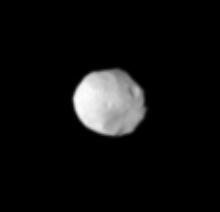Off Pandora’s Shoulder

| PIA Number | PIA07530 |
|---|---|
| Language |
|
This is one of Cassini's closest views to date of Saturn's F ring shepherd moon Pandora. At least one crater is visible on the surface of this moon, which is thought to be an icy rubble pile, loosely bound together by gravity. Pandora is 84 kilometers (52 miles) across.
Several of Saturn's ring moons, including Pandora, show elongated, oval-like shapes (see Pandora's Flocks) with their long axes oriented along the moon-Saturn line. In this view, Cassini is looking at the side of Pandora facing away from Saturn. The image shows the moon's leading hemisphere (although, as mentioned, Pandora is not actually round). To the right, much of the moon's surface is in shadow.
The image was taken in visible light with the Cassini spacecraft narrow-angle camera on May 20, 2005, at a distance of approximately 346,000 kilometers (215,000 miles) from Pandora and at a Sun-Pandora-spacecraft, or phase, angle of 21 degrees. Resolution in the original image was 2 kilometers (1 mile) per pixel. The view was magnified by a factor of two and contrast-enhanced to aid visibility of the moon's surface.
The Cassini-Huygens mission is a cooperative project of NASA, the European Space Agency and the Italian Space Agency. The Jet Propulsion Laboratory, a division of the California Institute of Technology in Pasadena, manages the mission for NASA's Science Mission Directorate, Washington, D.C. The Cassini orbiter and its two onboard cameras were designed, developed and assembled at JPL. The imaging team is based at the Space Science Institute, Boulder, Colo.
For more information about the Cassini-Huygens mission visit http://saturn.jpl.nasa.gov . The Cassini imaging team homepage is at http://ciclops.org .
Credit: NASA/JPL/Space Science Institute
